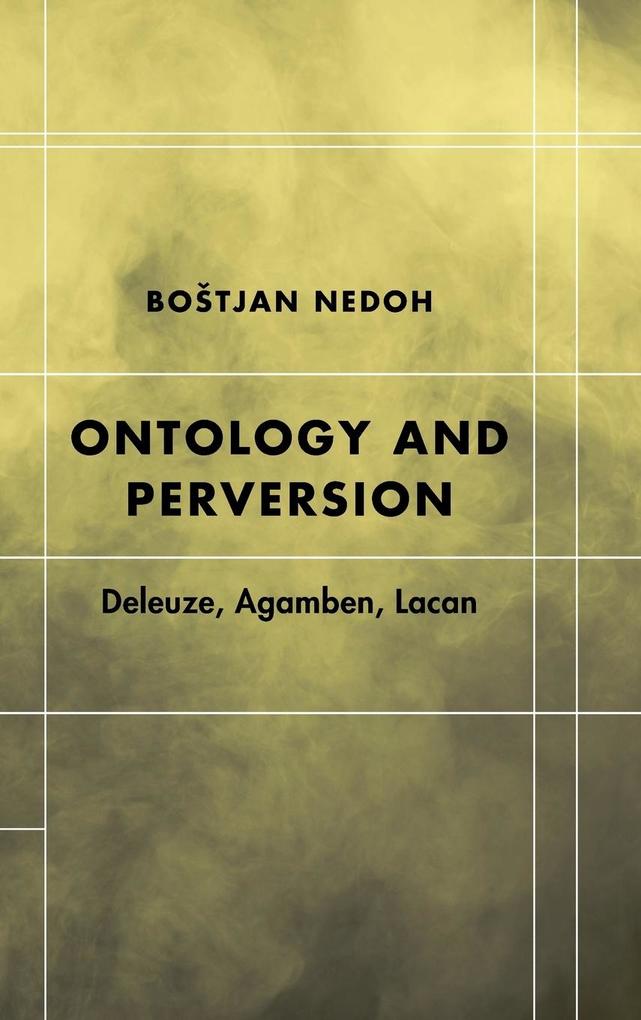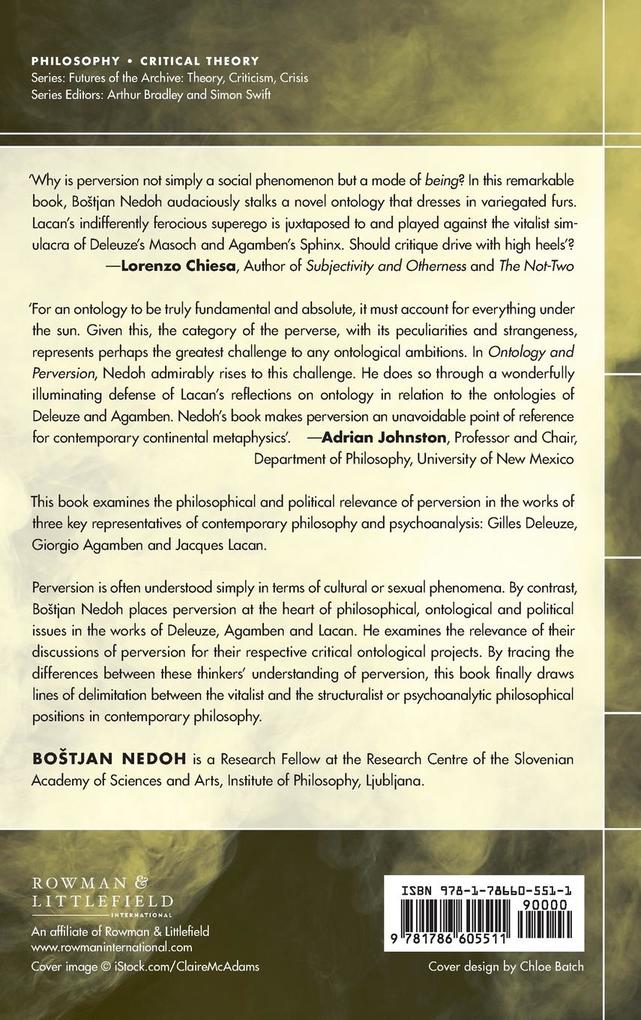
Zustellung: Do, 26.06. - Mo, 30.06.
Versand in 1-2 Wochen
VersandkostenfreiBestellen & in Filiale abholen:
This book examines the philosophical and political relevance of perversion in the works of three key representatives of contemporary philosophy and psychoanalysis: Gilles Deleuze, Giorgio Agamben and Jacques Lacan.
Perversion is often understood simply in terms of cultural or sexual phenomena. By contrast, Bö tjan Nedoh places perversion at the heart of philosophical, ontological and political issues in the works of Deleuze, Agamben and Lacan. He examines the relevance of their discussions of perversion for their respective critical ontological projects. By tracing the differences between these thinkers' understanding of perversion, the book finally draws lines of delimitation between the vitalist and the structuralist or psychoanalytic philosophical positions in contemporary philosophy.
Perversion is often understood simply in terms of cultural or sexual phenomena. By contrast, Bö tjan Nedoh places perversion at the heart of philosophical, ontological and political issues in the works of Deleuze, Agamben and Lacan. He examines the relevance of their discussions of perversion for their respective critical ontological projects. By tracing the differences between these thinkers' understanding of perversion, the book finally draws lines of delimitation between the vitalist and the structuralist or psychoanalytic philosophical positions in contemporary philosophy.
Inhaltsverzeichnis
Acknowledgments
Preface
Part I: Introductory: Perversion as a Theatre of Being
1 Perversions and Critical Ontologies: Ontologysing Perversion, Perverting Ontology in Deleuze, Agamben, and Lacan
Part II: Perversion between Deleuze's Transcendental Empiricism and the Ontology of Immanence Theatrum Philosophicum
2 Deleuze's Transcendental Empiricism: Simulacrum, Divergence and the Ontology of Difference
3 Masoch as a Name-of-Being
4 From Masoch to Tao: The Revision of Masochism in Late Deleuze
Part III: Beyond Metaphysics? Perversion in Agamben's Philosophy of Language and Political Philosophy Theatrum Politicum
5 Perverse Sphinx Against Oedipal Metaphysics: (Anti-)Metaphysics of Perversion in Agamben's Critique of Derrida and Freud
6 Messianism between Religion and Post-Religion: On the Perverse Structure of the Messianic Time
7 State of Exception and Sade's Biopolitical Manifesto
Part IV: Not Without the Other: Ontology and Perversion in Lacanian Psychoanalysis Theatrum Analiticum
8 Why Perversion Is Not the Norm of the Drive? Polymorphous Perversion from Freud to Lacan
9 The Birth of Perversion from the Death on the Cross: Lacan, Ž iž ek and the Question of Christian Atheism
10 The Sadistic Superego: From the Prohibition to the Imperative of Jouissance
Conclusion
Preface
Part I: Introductory: Perversion as a Theatre of Being
1 Perversions and Critical Ontologies: Ontologysing Perversion, Perverting Ontology in Deleuze, Agamben, and Lacan
Part II: Perversion between Deleuze's Transcendental Empiricism and the Ontology of Immanence Theatrum Philosophicum
2 Deleuze's Transcendental Empiricism: Simulacrum, Divergence and the Ontology of Difference
3 Masoch as a Name-of-Being
4 From Masoch to Tao: The Revision of Masochism in Late Deleuze
Part III: Beyond Metaphysics? Perversion in Agamben's Philosophy of Language and Political Philosophy Theatrum Politicum
5 Perverse Sphinx Against Oedipal Metaphysics: (Anti-)Metaphysics of Perversion in Agamben's Critique of Derrida and Freud
6 Messianism between Religion and Post-Religion: On the Perverse Structure of the Messianic Time
7 State of Exception and Sade's Biopolitical Manifesto
Part IV: Not Without the Other: Ontology and Perversion in Lacanian Psychoanalysis Theatrum Analiticum
8 Why Perversion Is Not the Norm of the Drive? Polymorphous Perversion from Freud to Lacan
9 The Birth of Perversion from the Death on the Cross: Lacan, Ž iž ek and the Question of Christian Atheism
10 The Sadistic Superego: From the Prohibition to the Imperative of Jouissance
Conclusion
Mehr aus dieser Reihe
Produktdetails
Erscheinungsdatum
04. Juni 2019
Sprache
englisch
Seitenanzahl
216
Reihe
Futures of the Archive
Autor/Autorin
Botjan Nedoh
Verlag/Hersteller
Produktart
gebunden
Gewicht
508 g
Größe (L/B/H)
235/157/17 mm
ISBN
9781786605511
Entdecken Sie mehr
Bewertungen
0 Bewertungen
Es wurden noch keine Bewertungen abgegeben. Schreiben Sie die erste Bewertung zu "Ontology and Perversion" und helfen Sie damit anderen bei der Kaufentscheidung.














